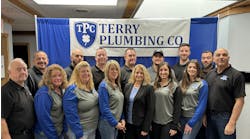Latest from Home
Industry Econ Forecast 2025
Sponsored
RYE, N.H. — Perched upon pristine Appledore Island six miles off the Maine/New Hampshire coasts, Shoals Marine Laboratory (SML) is host to educational programs for 250 students each year, from high school to post-grad.
A joint operation between Cornell University and the University of New Hampshire, the Shoals Marine Lab on Appledore Island operates chiefly during the summer months.
“One of our most progressive programs is for engineering undergrads,” says Mark Boutilier, coastal support specialist for Cornell. “We bring engineering students to the island for a month and present them with a list of projects, and turn them loose.”
Stewardship of the earth’s finite resources, the balance of ecosystems, and renewable energy technology are all topics of interest. A few years ago, the school received a National Science Foundation grant for a composting toilet facility.
In an effort to expand course offerings, Shoals Marine Laboratory is setting up a mainland, on-shore base of operations in Portsmouth at the historic, 33-acre Creek Farm property.
Related Articles:
Antebellum estate gets hydronic makeover
Related Articles:
Overcoming copper thieves, mold and deadly bacteria
After signing a 50-year lease with the Society for the Protection of New Hampshire Forest, SML began retrofit of one of the buildings — a carriage house — on the Creek Farm property to serve as SML’s new administrative headquarters. One of the needs to be addressed at the homestead was the need for a new heating system.
“Winters here are cruel,” says Boutilier. “The decrepit old system was over 30 years old and needed to be replaced. The wind comes ripping off the sea and into the building. We’ve seen 90-mph and -25°F in January is no oddity.”
High efficiency = small carbon footprint
Among the buildings on the coastal property, the turn-of-the-century carriage house is located mere yards from the rocky coast. The original building burned down, and an apartment building replaced it in the early ‘70s atop the old fieldstone foundation. Since that reconstruction, the cast iron sectional boiler had never been upgraded or exchanged.
As SML staff tore out and installed new walls, patched and painted the old building to make it more suitable for an office complex, the impending problem of the oil-fired boiler taking its last breath became increasingly apparent.
“Everything we do at SML is focused on sustainable living, and being responsible stewards of the environment,” says Professor Willy Bemis, director of SML. “When we learned that the building would need a new mechanical system, we didn’t know what to do. Nearly all the funding for SML is being used for educational purposes on the island, so there wasn’t surplus for a new heating system, let alone a high efficiency system."
A neighbor at Creek Farm heard about the mechanical system plight, and introduced Bemis to Bill Root, general manager at Laars Heating Systems, who lives nearby.
Since SML is a non-profit organization, and their work tremendously aids the northeastern coastline, Laars, headquartered only 30 minutes away in Rochester, N.H., decided to donate a boiler and indirect-fired water heater for the new office facility. Rymes Propane & Oil Inc., Concord, N.H., which has had a long-standing relationship with the lab, would handle the installation.
The old two-story 4,000-sq.ft. building needed a sizeable boiler, especially if it was to meet the call for domestic water as well. The heat load info was passed on to the specialists at Laars, who had the just answer to the problem SML was facing. They sent a 210,000 95% efficient NeoTherm boiler.
The sealed combustion modulating condensing boiler is a packaged unit with an output range of 80, 105, 150, 210, 285, 399, 500, 600, 750 and 850 MBH.
Installing contractor Rymes Propane & Oil, spent three days on the boiler swap-out. The multi-faceted company serves New Hampshire and surrounding areas as a full service fuel delivery company, as well being the largest heating contractor in the area. With 10 locations in the state, Rymes has, for years, provided propane to SML for its Appledore Island facility. When the 160-person company learned of the need for boiler installation, it wasn’t long before a crew was on the job.
“Two of our techs replaced the old boilers and removed the oil tanks,” says Charlie Driscoll, service manager at Rymes. “The hydronic baseboard was still in good condition, but we replaced all the old circulators as well. We were in and out in three days.”
“The upstairs was divided into two zones,” says Vince Bane, technician for Rymes. “Another zone feeds a 50-gal. indirect water heater that Bradford White sent to Shoals.”
“The indirect was a perfect fit for the thermal storage needs of the building,” says Driscoll. “The well-insulated unit fit in with what Shoals was trying to accomplish.”
Three new Taco 007 circulators are hooked to an SR 506-EXP switching relay for the three zones.
"I’ve used Taco pumps for as long as I can remember,” adds Driscoll. “We prefer installing them since it’s buying local, and we have excellent results every time.”
Despite the challenges
Funding the laboratory is no easy task, but more troublesome would be to ignore the interests of a generation of young people who not only care about the environment around them, but are educated and ready to take action. Shoals Marine Lab stirs interest in sustainability and preservation. Motivated scientists and engineers are needed to develop new, Earth-friendly technology, and Shoals is a great place to light the flame. With help from generous manufacturers and community-oriented companies, the work can continue.
“Our family has a long history on the Isles of Shoals and with the Marine Lab,” says Tom Rymes, a principal at Rymes Propane and Oil. “My mother has been a volunteer on the island, and we have regularly donated fuel to the lab. We were glad to be able to help them out again this time.”
“The new, super-efficient system is a step in that direction,” says Cornell’s Boutilier. “It’s quiet, making less noise then a microwave. We’re setting up a new laboratory area near where the boiler is in the basement, so the lack of noise will be appreciated. The last remaining portion of the system to be installed is a zone in the basement where we’ll install a pair of fan coil units to heat the lab.
“The mechanical system is a perfect match to our need, and to our philosophy of sustainability," concludes Boutilier. "Now we can preach what we teach.”


